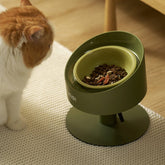Medical Routine Your Cat Needs

As a cat owner, it is essential to provide regular health care for your feline companion to ensure that they remain in good health throughout their life. Routine veterinary visits, proper nutrition, grooming, and protection from household hazards are all part of general care that is not related to emergencies. In this blog, we will delve into the importance of veterinary care, signs of illness, administering medication, vaccinations, parasite control, dental care, grooming, and spaying/neutering.
Routine Health Care Is Critical
To ensure your cat remains in good health throughout its life, it's important to provide regular general care that isn't related to emergencies. This includes scheduling routine veterinary visits for vaccinations, parasite control, and dental care, ensuring your cat is eating a balanced and healthy diet, keeping your cat well-groomed, and protecting it from potential household hazards.
Essential Veterinary Check-ups
It is recommended that adult cats receive a comprehensive veterinary check-up once a year. For kittens, veterinary visits are usually required every 3 to 4 weeks until they reach about 4 months old. Geriatric cats (aged 8 to 9 years or older) should see their veterinarian twice a year or more frequently as they are more likely to experience illness, which should be detected early for proper treatment. Your veterinarian may also suggest a wellness program for your pet, which may include routine blood tests to monitor for early kidney or liver disease.
Recognizing Signs of Illness
As a pet owner, watch for signs of illness in your cat such as loss of appetite, decreased activity, vomiting, diarrhea, coughing, sneezing, changes in urination, discharge from eyes, ears or nose, and skin irritation. Schedule a vet visit if you notice these symptoms lasting more than a day or two.
Tips for Giving Medication to Your Cat
Administering medication to your cat can be a tricky task. While some cats may take a pill hidden in their treat, others may eat the treat and spit out the pill. In such cases, you may need to learn how to tip your cat's head so that they are looking up and place the pill directly at the back of their mouth for swallowing. If your cat needs liquid medication, you can give it via a syringe into the rear of their mouth. Spot-on products or other topical medications are applied directly on their coat or skin. It's important to read and follow all instructions on the label, and your veterinarian or veterinary technician can guide you and give you a demonstration.
Vaccinations

Cats rely on vaccinations as a crucial part of preventive medicine. The purpose of vaccinations is to prepare the immune system against potential infections before any exposure to disease. In order to provide the necessary protection against serious infectious illnesses, such as panleukopenia and herpesvirus, several vaccines are given to cats as part of their core defense. Additionally, there are noncore vaccines that are important in certain regions and situations, such as feline leukemia virus. It is best to consult with your veterinarian to determine which vaccines are recommended for your cat based on your local area and circumstances.
Parasite Control
Intestinal worms harm the digestive tract, leading to blood loss and nutrient deficiencies. Detect infections by identifying worm eggs in fecal samples. Test fecal samples regularly in cats. It is recommended to test fecal samples multiple times in kittens, periodically (usually yearly) in indoor cats, and at least twice a year in outdoor cats. Outdoor cats are more prone to parasites. Cats can also be infected with microscopic parasites like Toxoplasma, which can cause mild digestive upset however, it can cause severe illness if transmitted to humans.
Heartworm is another parasite that can affect cats. It is transmitted by mosquitoes and can be detected through a blood test. Before giving your cat any heartworm preventives, it's essential to speak with your vet. They can recommend the right medication and dosage based on your cat's needs. You can choose between pill or spot-on forms, and it's important to administer it monthly to protect your feline friend from this serious condition. Unfortunately, there is no effective treatment for heartworm infection in cats, so prevention is essential. Fleas, ticks, mange mites, and ear mites are external parasites that can be controlled with monthly preventive treatments in the form of body sprays or "spot on" preparations can control fleas and ticks.
Dental Care
To maintain your cat's oral health, it's important to provide them with regular dental care throughout their life. Dry food can help keep their teeth and gums in good condition, and professional dental cleanings performed by your veterinarian can also be beneficial. You can also take various measures to maintain your cat's dental hygiene at home by brushing your cat’s teeth giving dental diets, chews, and treats. By taking these steps, you can help reduce the buildup of plaque and prevent the development of gingivitis and gum disease, which can lead to tooth extraction in severe cases. Keep in mind that good dental care is essential for your cat's overall health and well-being.
Grooming
Healthy cats don't typically require bathing, but if it becomes necessary, be sure to use only pet shampoos approved for use on cats. Short-haired breeds usually don't require much brushing or bathing from their owners. However, if you have a long-haired cat or a cat that is not grooming itself due to illness, it’s important to routinely brush them to remove any shed hair and prevent hair mats.
Brushing also helps limit the amount of hair they ingest, which can reduce the development of hairballs. Grooming can also be a great way to bond with your cat and be used as a reward. If your cat develops mats, be sure to use electric clippers instead of scissors to avoid cutting their skin.
Another important aspect of cat care is checking their ears regularly for cleanliness. Dirty ears can harbor organisms that may lead to infection, so it's crucial to keep them clean.
It's easy to overlook your cat's claws until they become too long and sharp. However, when it's time for a trim, gently press your cat's foot to reveal the claws and use a cat nail trimmer to only cut the white tip of the nails. Be careful not to cut the pink area as it is sensitive and contains nerves and blood vessels. If cleaning is necessary, it's best to ask your veterinarian to demonstrate how this should be done safely.
Household Hazards

It's important to protect your furry friend from potential hazards around the house, including cleaning supplies, chemicals, pesticides, antifreeze, electrical cords, and certain house plants that may be toxic to them. Kittens and curious cats are at the greatest risk, so it's crucial to keep these products out of reach at all times. Additionally, cats can be particularly sensitive to many medications commonly found in households, including aspirin, acetaminophen, ibuprofen, and cold remedies. It's best to avoid giving your cat any human medication unless your veterinarian specifically instructs you to do so. It's also important to keep cats and kittens away from open windows or balconies in multi-story buildings. Although cats are agile and can often right themselves in mid-air, they can still sustain serious injuries if they fall from a great height.
Spaying/Neutering
To prevent unwanted kittens and potential future medical complications such as uterine cancer or infection, it's recommended to have female cats spayed and male cats neutered unless they're used for breeding. Spaying or neutering also reduces the desire to wander outside, which can lead to injuries such as car accidents or fights. In addition, neutered male cats are less likely to spray urine to mark their territory. The procedure is typically performed on cats when they're around 6 to 7 months old.
Conclusion

Ensuring the general health of your cat requires regular attention and care. From routine veterinary visits to proper nutrition, grooming, and protection from household hazards, there are many things you can do to keep your feline friend healthy and happy throughout their life. By following the guidelines discussed in this blog, you can help prevent illness and ensure your cat's overall well-being. Remember, a healthy cat is a happy cat!























